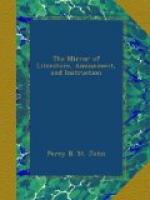The holy edifice stood in those days, when Arezzo was but a small place, at some little distance from the dwellings of the citizens, and was surrounded by a thick grove of sycamores mingled with pine trees. The townsfolk had long retired to rest, and the streets were empty and desolate. Not even the shadow of a monk flitted by him as he passed, with his torch flaring in the wind, and casting an awful and almost magical light upon the houses, painted, according to the fashion of the time and country, in broad stripes of deep red and white. As he approached the church, the wind, whistling through the pine branches, which swung to and fro, and flapped against each other, like the wings of the fabled Simoorg, or of some mighty demon struggling with the blast, sounded like numerous voices issuing from the black roof of clouds above him, and shrieking as he passed. At length he entered the church, which in those times stood open day and night to the piety of the people, and drew near the altar. Upon the walls on both sides were suspended rude images of the Saviour carved in wood, and blackened by time, and numerous antique scripture pieces by Giotto, Cimabue, and other fathers of the art, which seemed to start into momentary existence as Spinello’s torch cast its red light upon them. At every step, his heart beat violently against his side, and appeared as if it would mount into his throat and choke him. But his courage did not fail, and he ascended the Mosaic steps of the chancel, and, with his torch in one hand, climbed up upon the altar and lifted his eyes towards the picture. As he stood on tip-toe on the altar and passed his torch along the wall, the mighty ranks of the fallen angels, in headlong flight before the thunderbolts of heaven, seemed to emerge from the darkness, with the awful form of Lucifer in the extreme rear reluctantly yielding even to Omnipotence itself, while blasting lightnings played about his brow and eyes, that flashed with the fires of inextinguishable fury. On first casting his eyes over his picture, a feeling of self-complacency and pride stole over the soul of the artist. But as he continued to gaze with a kind of idolatry at the work of his own hands, his imagination became excited by degrees, and life appeared to be infused into the figure of the gigantic demon. In spite of the singular beauty of the features, which looked like those of an archangel, the face before him appeared to be but a mask, beneath which all the passions of hell were struggling, gnawing, and stinging, and devouring the heart of their possessor. “The baleful eyes, that witnessed huge affliction and dismay,” appeared to flame in the obscure light, like the fabled carbuncle of the Kaianian king; and the mighty limbs seemed to make an effort to free themselves from the canvass, and spring forth upon the floor of God’s temple. As this idea rushed upon the mind of Spinello, the wind, moaning through the aisles, and multiplied by the echoes, sounded like the voices of wailing




